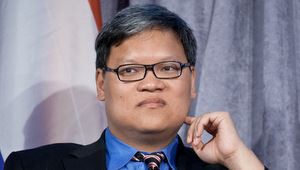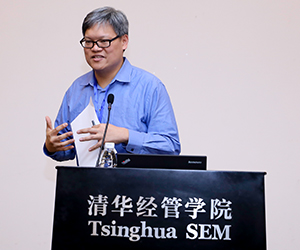 |
| Zhang Lijia |
Commentator Dan Southerland
of Radio Free Asia is clearly touched by the moving book
Lotus: A Novel by
journalist Zhang Lijia on the life of prostitutes in China. "An uplifting book on a sad subject," he says about the book.
Radio Free Asia:
A second book, titled simply Lotus, is a novel that provides deep insights into the lives of the migrant Chinese workers whose cheap labor has created China’s economic miracle.
Among those workers, thousands of women who feel crushed by assembly-line factory work in the big cities have turned to prostitution. A character named Lotus is one of them.
Author Lijia Zhang creates a sympathetic portrait of this young prostitute, at the same time shedding light on the plight of China’s migrant workers.
As journalist and writer Ian Johnson says in a review, Zhang's book opens a window into “a land of underground sex trade, corrupt police, desperate migrants, and flawed characters trying to make the right decisions.”...
Her sympathetic portrayal of the life of a prostitute named Lotus working at a massage parlor in the economically booming city of Shenzhen also turns out to be a love story and a testament to one woman’s strength.
Lotus’s story begins as a typical one for many migrant workers, the unsung heroes of China’s economic rise.
Her massage parlor in Shenzhen lies hundreds of miles to the southeast of her rural village in Sichuan Province, and she can rarely afford to make a trip home.
Her main aim in life is to send money home to assist her family and ultimately to help her brother Shadan realize his dream of entering a university. He would be the first in his poor village to achieve this goal.
Her family has been told that Lotus is working in a Sichuan restaurant in Shenzhen and not as prostitute.
Like so many migrant workers, she had arrived in Shenzhen to work in a factory outside the city. Her cousin, nicknamed “Little Red,” had talked her into taking the job. But after her cousin died in a fire at the factory, she decided to find work in the city.
When her lack of a high school diploma disqualified her from the best jobs, she turned to prostitution, first as a street walker and later in a massage parlor, often fronts for prostitution.
While officially illegal, prostitution has become an industry in China that would appear to be hard to eliminate, though police do launch periodic campaigns against it. One of the most dramatic scenes in the novel describes a raid on her massage parlor in which some of Lotus’s friends are beaten.
The camaraderie among the girls while under detention, their jokes about their plight, and the offer of one to share what little money she has to pay off the police becomes one of the most touching moments in the book.
It’s hard to imagine that a book on this sad subject could be uplifting, but this one is.
More at Radio Free Asia.
Zhang Lijia is a speaker on the China Speakers Bureau. Do you need her at your meeting or conference? Do get in touch or fill in our speakers´request form.
Are you looking for more experts on cultural change at the China Speakers Bureau? Do check out this list.





























